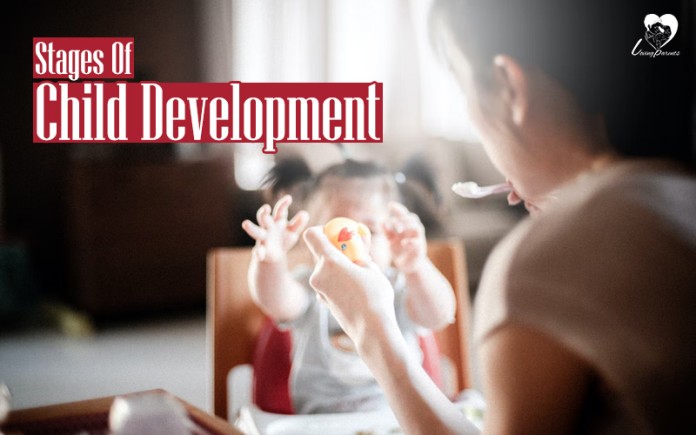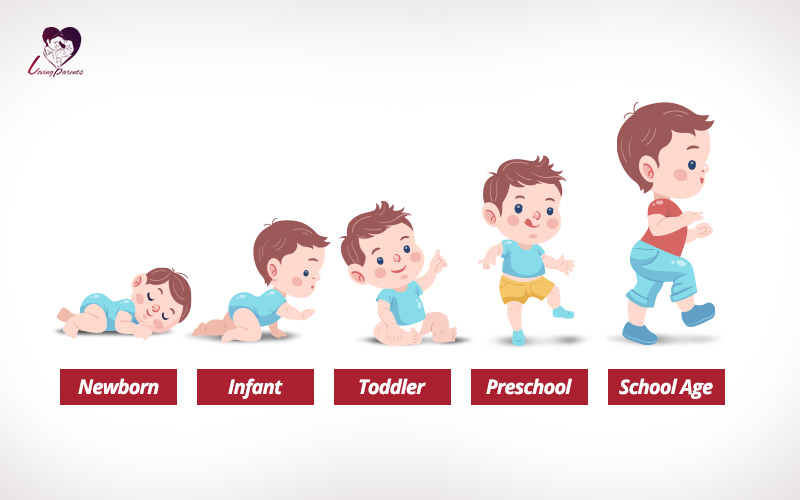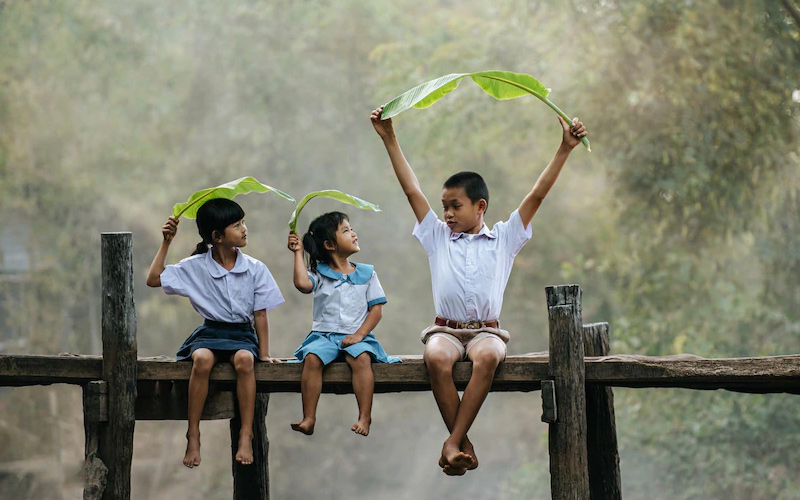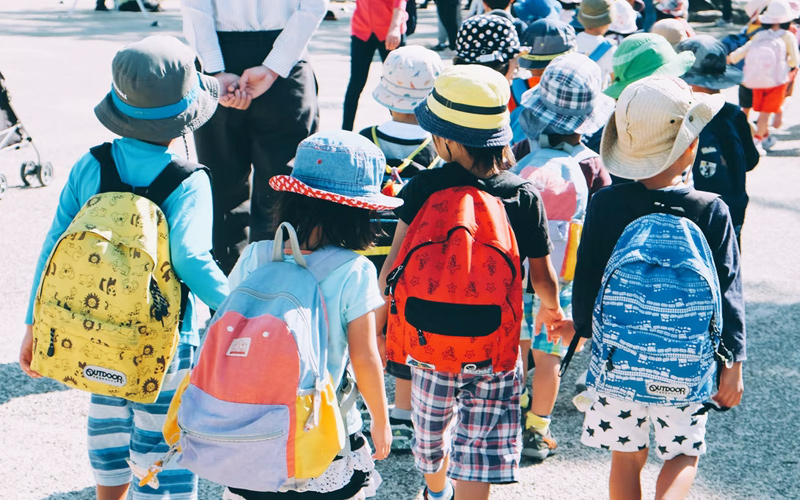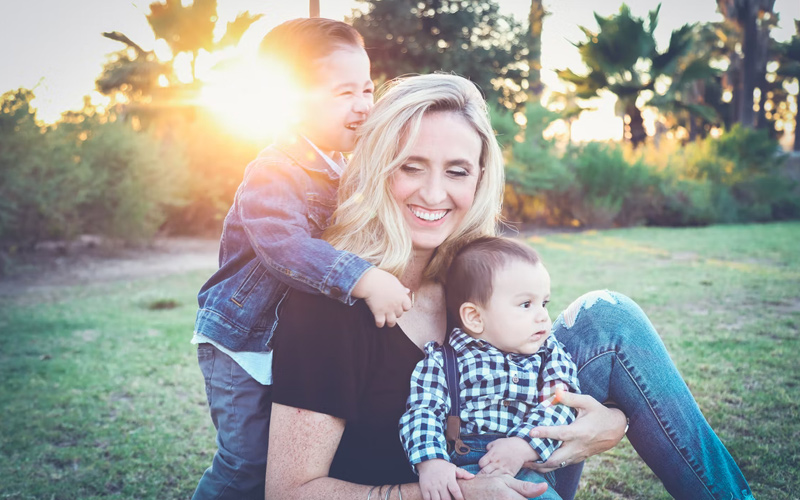Children change rapidly as they start growing up and many of these changes are physical. Other changes like cognitive which means the changes that affect the way children think and learn also change. Child development often occurs in stages where the majority of children need specific development landmarks by the time they reach a certain age. Know the different child development stages in this article.
Scholars have opinions that differ from each other on the exact number of stages of development children go through on their way to becoming an adult.
Newborn : The phase of the first month of life a newborn exhibits automatic responses to external stimuli. When you stroke the cheek of your newborn or grab your finger when you place it in their hand the newborn will turn their head towards your hand. A newborn is able to see objects close up, smile or cry to indicate a need, recognize certain smells and move their head from side to side. Newborns may also show signs of such developmental disabilities like spina bifida, genetic disorders, and fetal alcohol syndrome.
Infant : Infants are the ones who develop new abilities quickly in their first year. Around 3 to 6 months an infant controls the head movements and brings their hands together. By the age of 6 to 9 months, they sit without support, respond to their name, and babble. And between 9 to 12 months old the baby can pick up objects, crawl and even stand with support. In infants, low development is a sign of down syndrome and other developmental disabilities.
Toddler : When the child reaches the age between 1 to 3 years they learn to walk without help, jump in place, and climb stairs. They can even draw a circle, hold a crayon, use short sentences, stack one block on top of another, and even start to follow simple instructions.
Preschool : The children between the age group of 3 to 5 years can refine their motor skills. They can skip and hop, stand on one foot, dress themselves, throw a ball overhand and even draw a person with features. During this stage of development, signs of developmental disabilities like cerebral palsy may appear.
School Age : Children between the age group of six to 12 years come under the school age development stage. In this stage, they are capable, independent, responsible, and confident. Relationships like peer relations especially with friends of the same gender are important for school age children. The children who come under older school age begin to develop sexual characteristics. Signs like trouble staying focused and being easily distracted have appeared at this stage.
Development Table: Birth to 5 years
Child Development Stage : Birth to 3 Months : Newborn babies are great and amazing because every single day they bring new developments and changes to the table. Every baby develops differently and does that at their own pace. Your baby can do stretching and kicking, even grasping things like your finger and responding to noises that are loud.
- They begin to smile and visually track people and objects with their eyes.
- They prefer to look at bright colors and faces.
- Listen to the sounds they like.
- Discovers hands and feet and starts reaching for things.
- When on their tummy they can lift their head.
- They start crying over anything and will feel better when you comfort them.
Read Also: Easy Step-by-Step Guide to Changing Your Baby’s Diaper
Child Development Stage : 4 to 6 months : Your baby has been home for a few months and you will notice that they are becoming more social and have a purpose for every movement. They not only start discovering their hands and feet but also learn that they can do things like grabbing hands, hair, or holding a toy. They start sleeping longer, laugh more, start squealing when they are happy, and are more social. Babies are the busiest in this age as they explore their surroundings and become more familiar with the surroundings and people.
- They smile and laugh and also intimate the sounds that they hear
- They learn about their body, explore their hands and feet.
- SIt up when you prop them like they are sitting on a couch or a chair.
- They love to scoot, bounce and rollover.
- They start grabbing things without using their thumb and love to put things in their mouth. So try to keep small objects away from their reach.
Child Development Stage : 7 to 12 months : At this stage, the baby starts moving around and is not going to sit still for a long time. They do things like crawling, standing, rolling over, and a lot of cruising. They will also test their strength and pull themself up from the floor to stand against the wall, sofa, or table. And here first steps are not far away.
- They start thinking they are big now and want to take those first steps so watch them.
- Sing and play children songs to them so they can move and dance.
- Games like peek-a-boo, pat-a-cake, and wave goodbye are fun to them.
- Starts understanding their name and other words that are frequently used in front of them.
- They start vocalizing.
Read Also: How to develop skills and engage your kids during the Coronavirus Lockdown
Child Development Stage : 1 to 2 years : Your child starts becoming aware of their own behavior as well as those who are around them at this age. They are eager to learn and start to communicate through words as well as facial expressions.
- Starts talking and understanding words and ideas.
- Love stories and riding toys.
- They can walk, run and even climb stairs.
- Like to read books and scribble.
- They start solving simple problems
- Have friends around and start to play with them.
Child Development Stage : 2 to 3 1/2 years : Your toddler is now beginning to develop their own distinct personality. You can even see big changes in their social, intellectual, and emotional abilities. They start exploring on their own and never leave them unattended for a longer time, especially around water and cars.
- They like to learn new things.
- Runs everywhere just because they love to be on the go.
- They increase their vocabulary and repeat words that you say or hear on the television.
- Starts to get frustrated easily.
- Brush their teeth and wash their hands and face on their own.
- Acts more independently but they still depend on us.
Read Also: Month By Month Diet Chart For Pregnant Women
Child Development Stage : 3 1/2 to 5 years : Children grow up very fast, especially for the next 18 months. This age stage is when the child starts interacting with other kids at school as well as their teachers and other relatives. Believe it or not, they also start following simple directions.
- They have a longer attention span than before.
- They might start using language that is not nice or act silly.
- Start asking a lot of questions.
- Wants to play with friends but doesn’t like to lose.
- They are still learning to share stuff.
Development Table : School-Age
Child Development Stage : 6 to 8 Years : This stage is when your child is in middle childhood which brings many changes in the life of your child. By this time they will dress themselves, will be able to catch a ball more easily by their hands, and tie the lace of their shoes. Their independence from family becomes more important at this stage. Events like going to school bring your children in regular contact with the larger world of their age. Friends play and become more and more important in their life. Skills like physical, mental, and social develop quickly at this time. This time is critical for the development of your kid’s importance in all the areas of life such as through schoolwork, sports, and friends.
Here is some information on how children develop during the middle childhood phase :
- Shows independence from family and parents
- Starts thinking about the future
- Understand more about their place in the world
- Pays attention more to teamwork and friendships
- Want acceptance and to be liked by friends.
Learning and Thinking :
- Shows development of mental skills rapidly
- Learns better ways to show and describe their experience and talk about their thoughts and feelings.
- Have less focus on one’s self and focus more concern on others.
Child Development Stage : 9 to 11 Years : Your child will grow independent from the family and interest in friends might be more obvious by now. Healthy friendships for a child’s development are very important. But sometimes peer pressure can become strong during this time. Children feel good about themselves are resist negative peer pressure and make better choices. This stage is an important time for children to gain some sense of responsibility along with growing independence. Also on the other hand physical changes of puberty might start showing especially for girls which is another big change children need to be prepared for during the time of their middle and junior high school.
Here is some information on how children develop during the middle childhood phase :
Emotional Changes :
- Start to form stronger and more complex friendships and peer relationships. It is an emotionally important thing to have friends, especially of the same sex.
- More peer pressure experience.
- Becomes aware of their body as puberty approaches them. Baby image and eating problems start around this age.
Learning and Thinking :
- More academic challenges are faced at school.
- More independence from the family is shown.
- Starts to see the point of view of others more clearly.
- Have increased attention span.
Tips for Parents About Kids Developmental Concerns
- Spend some time with your child and talk to them about their friends, accomplishments, and challenges that they face.
- Get involved with your child’s school and go to the events that happen in school; meet their teachers.
- Encourage your child to join school groups and other community groups such as a sports team or a drama team or it can even volunteer for a charity.
- Help your child to develop a sense of right and wrong. Try to talk about risky or unwanted things their friends might pressure them to do like dangerous physical dares, smoking, or drinking.
- Help them develop a sense of responsibility, try to involve them in household tasks like cooking or cleaning. Talk with them about saving money and spending it wisely.
- Meet your child’s friend’s family.
- Talk with your child about showing care and respecting others. Encourage them to help other people who are in need and tell them about what they should be doing when others are not kind or disrespectful to them.
- Help them set their goals and encourage them to think about developing skills and abilities they would like.
- Make rules which are clear and stick to them. Talk to your child about what you expect from their behavior when no adult is present around them. If you give them reasons behind the rules it will be helpful for them to know what to do in most situations.
- Instead of punishment to make your kid feel bad about themselves, use discipline to guide and protect them.
- When you use praise try to help your child think about their own accomplishments by saying “you must be proud of yourself” rather than saying “I am proud of you” which will encourage your child to make good choices when nobody is around them to praise.
- Talk with your child about normal changes that occur physically and emotionally after puberty.
- Encourage your child to read on a regular basis and talk with them about the homework.
- Be honest and affectionate towards your child and do things as a family together.
- Talk to them about their concerns and pay attention to if they have any change in behavior. Let them know that you care and show the trust that you will stand by their side.
- Show interest in their extracurricular interests and activities and encourage them to get involved in activities like music, art, theater, and sports.
- Encourage your child to involve and volunteer in civic activities.
- Celebrate your kid’s efforts and accomplishments.
- Spend some time together doing things that they enjoy doing.
- Respect their opinion and listen to them without playing down her concerns.
- Encourage your child to develop solutions towards problems or conflicts. Let them learn to make good decisions and create opportunities to use their own judgment and be available for advice and support.
- If your child starts working then use that opportunity to talk about expectations, responsibilities, and other ways of behaving respectfully in a public setting.
- Respect their need for privacy.
- Help your kid plan ahead for difficult or uncomfortable situations.

